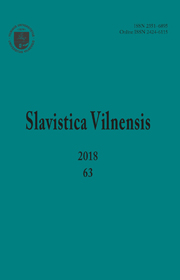Топонимика западного побережья Чудского, Теплого и Псковского озер в аспекте оппозиции “свой” – “чужой”
Toponymy of the Western Coast of Lake Peipus, Lake Teploe and Lake Pskov in the Aspect of “Own”–“Alien”
Author(s): Valentina ShchadnevaSubject(s): Regional Geography, Theoretical Linguistics, Applied Linguistics, Eastern Slavic Languages, Philology
Published by: Vilniaus Universiteto Leidykla
Keywords: Russian language; interaction of languages; toponyms in language and speech; toponymic legend; “own”–“alien”; Old Believers;
Summary/Abstract: The article is devoted to toponyms of the western coast of Lake Peipus, Lake Teploe and Lake Pskov. Firstly, the article discusses the names of the villages in which the Old Believers live. Two ways in which the idea of “own”–“alien” is realized in toponyms are considered. In the first case we are talking about interaction, about the mutual influence of languages: Estonian geographical names are russified, adapted grammatically and phonetically (Raja — Ра́я / Раюша / Ра́юши), and Russian ones are estonified (Воронья́ — Ва́рнья / Varnja). The “alien” is assimilated and eventually becomes “own”, which means the realization of the idea of “own“–“alien” in the language itself. In the second case we are talking about the use of toponyms in everyday communication. Speech practice shows that the Russian population of the coast uses place names depending on the addressee, but preference is given primarily to Russians, as well as long-adapted Estonian-born nominations that are perceived as their own. This is an ethno-confessional identity.
Journal: Slavistica Vilnensis
- Issue Year: 63/2018
- Issue No: -
- Page Range: 245-261
- Page Count: 18
- Language: Russian

